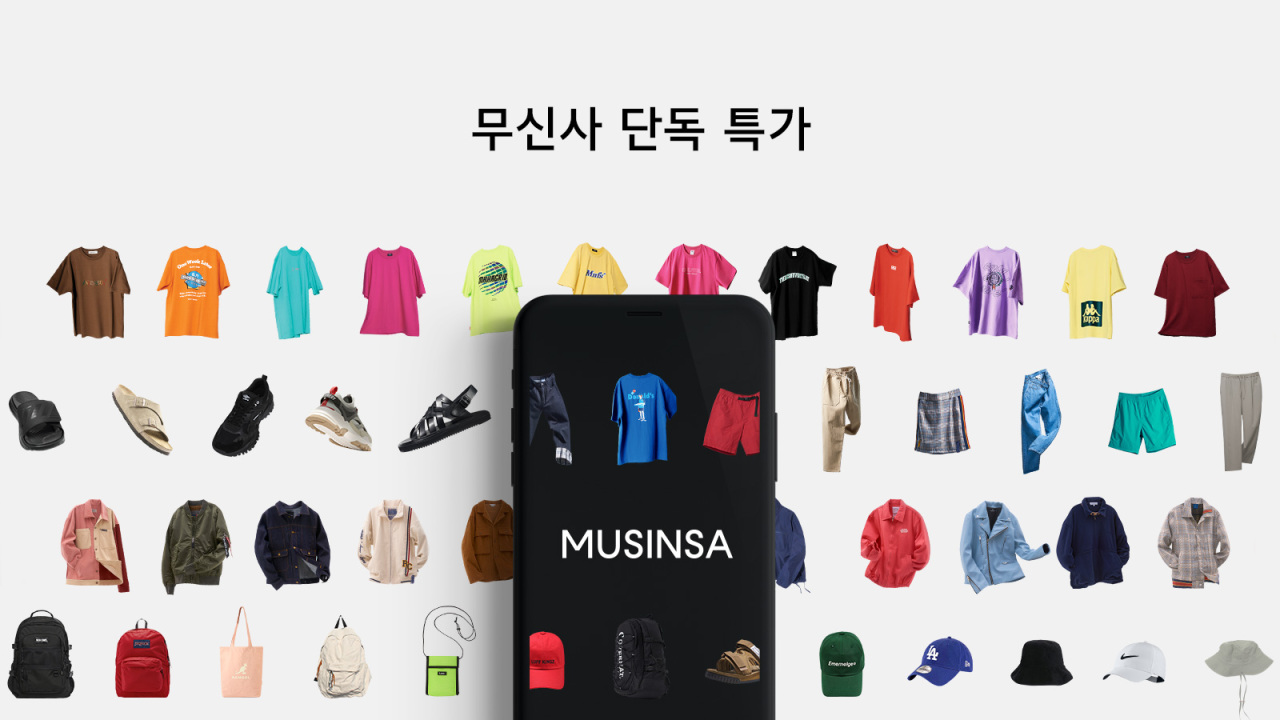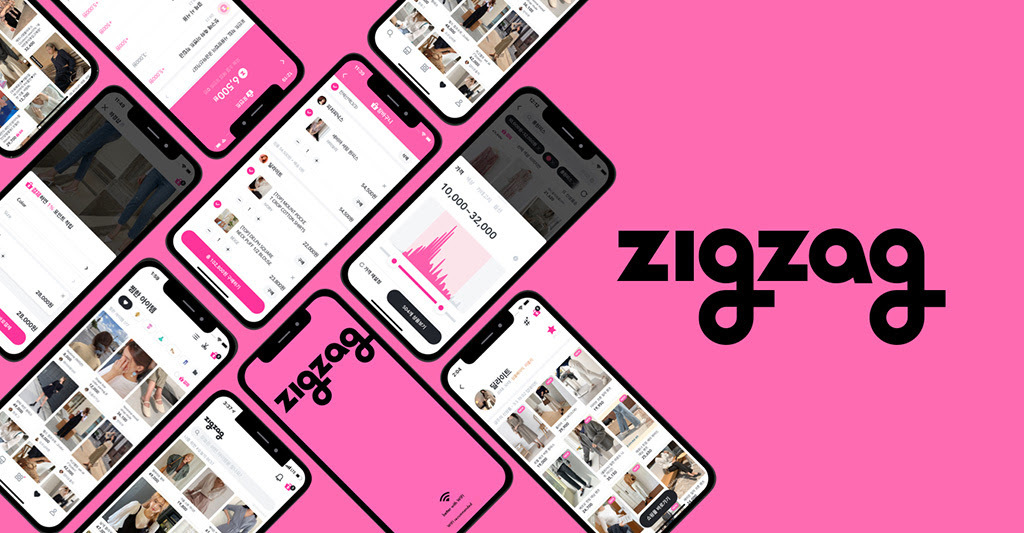[Weekender] The rise of curated fashion platforms
Multibrand online stores are changing the way we shop for clothes
By Yim Hyun-suPublished : May 1, 2021 - 16:01

Having a lot of tabs open while browsing for clothes online? For a growing number of shoppers, those days are over.
Similar to how going to a shopping mall with a wide range of brands seems more of a safe bet than having to travel between stores far apart from each other, more people in South Korea are turning to platforms like Musinsa and Zigzag -- algorithm-driven e-commerce fashion platforms where shoppers are presented with items from thousands of brands.
Musinsa, which boasts some 6,000 brands and 8.4 million users as of this month, posted an aggregate turnover of 1.2 trillion won ($1 billion) in 2020. The revenue was 331.9 billion won, a 51 percent increase from the previous year. The number of users also jumped by over 40 percent over the same period.
That performance comes against the backdrop of one of the worst years in recent memory for retail fashion, as the coronavirus pandemic forced people to stay indoors and curbed their desire to venture out to buy new clothes.
“We proactively invested in recruiting talent and effectively launched a TV advertising campaign when the fashion industry was struggling as a result of COVID-19,” Musinsa CEO Cho Man-ho said in a statement released earlier this month.
Though its operating profit was down 7 percent last year, the company explained it was due to its decision to hire new people and expand investment in launching new services and marketing.
Zigzag, another multibrand fashion shopping app, also posted a turnover of 750 billion won last year, racking up over 30 million downloads as of this month.
The women’s fashion app, which boasts some 4,000 stores, has largely appealed to those in their 10s, 20s and 30s.
“Some 10,000 new items are made available on Zigzag every day,” one representative at Croquis, the company behind the app, said when asked about the growing popularity of the platform.
Thanks to its cutting-edge algorithm, it helps keep users on the app by tailoring to their individual preferences as they navigate through the plethora of clothes and shoes available.
“We began collecting big data about each customer’s preference soon after the app was launched -- what items they have looked at, clicked on, put on the wish list, paid for and put in their cart. And we have developed our own algorithm based on big data regarding these shopping patterns and our work to improve it continues,” the official said.
This means the app’s home page is customized to each user.
“With so many products and stores on the platform, we carefully display things shoppers might like to buy based on their shopping patterns,” the official added.
Similar to how going to a shopping mall with a wide range of brands seems more of a safe bet than having to travel between stores far apart from each other, more people in South Korea are turning to platforms like Musinsa and Zigzag -- algorithm-driven e-commerce fashion platforms where shoppers are presented with items from thousands of brands.
Musinsa, which boasts some 6,000 brands and 8.4 million users as of this month, posted an aggregate turnover of 1.2 trillion won ($1 billion) in 2020. The revenue was 331.9 billion won, a 51 percent increase from the previous year. The number of users also jumped by over 40 percent over the same period.
That performance comes against the backdrop of one of the worst years in recent memory for retail fashion, as the coronavirus pandemic forced people to stay indoors and curbed their desire to venture out to buy new clothes.
“We proactively invested in recruiting talent and effectively launched a TV advertising campaign when the fashion industry was struggling as a result of COVID-19,” Musinsa CEO Cho Man-ho said in a statement released earlier this month.
Though its operating profit was down 7 percent last year, the company explained it was due to its decision to hire new people and expand investment in launching new services and marketing.
Zigzag, another multibrand fashion shopping app, also posted a turnover of 750 billion won last year, racking up over 30 million downloads as of this month.
The women’s fashion app, which boasts some 4,000 stores, has largely appealed to those in their 10s, 20s and 30s.
“Some 10,000 new items are made available on Zigzag every day,” one representative at Croquis, the company behind the app, said when asked about the growing popularity of the platform.
Thanks to its cutting-edge algorithm, it helps keep users on the app by tailoring to their individual preferences as they navigate through the plethora of clothes and shoes available.
“We began collecting big data about each customer’s preference soon after the app was launched -- what items they have looked at, clicked on, put on the wish list, paid for and put in their cart. And we have developed our own algorithm based on big data regarding these shopping patterns and our work to improve it continues,” the official said.
This means the app’s home page is customized to each user.
“With so many products and stores on the platform, we carefully display things shoppers might like to buy based on their shopping patterns,” the official added.

The growing demand for multibrand platforms in recent years is a response to the increasing number of direct-to-consumer stores in the country which has seen the online shopping business expand at one of the fastest rates in the world, according to Cafe24, a Seoul-based global e-commerce platform provider.
“This type of curated e-commerce makes the shopping experience easier for consumers,” said an official from the platform, which helps connect clothing stores to multibrand platforms such as Musinsa, Zigzag and StyleShare.
It is also a smart move from a business perspective.
“Whether it was an online marketplace or (Naver’s) Blog Market, online store operators could just sell their products through one channel in the past,” the Cafe24 official said. “But these days, building an omnichannel strategy is crucial including online marketplaces, multibrand stores as well as social media.”
The official went on to explain that the rise of discovery shopping, a type of online shopping that focuses on the browsing aspect of the experience, has helped multibrand platforms thrive. But now small stores too are eager to form partnerships with them in order to raise awareness of their brand, it added.
In a further sign of the growing demand for multibrand fashion shopping apps, Kakao announced it would launch a joint venture with Croquis earlier this month.
The plan will see the style business division spun off from its subsidiary Kakao Commerce to merge with Croquis on July 1.
“With vertical fashion platform Zigzag being the number one business in women’s fashion and Kakao boasting a user base that essentially covers the whole of the general public, we expect synergy between each other,” a Croquis representative said of the merger.
The move follows on the heels of a recent decision by Shinsegae Group’s online platform SSG.com to acquire womenswear e-commerce platform W Concept by purchasing whole shares previously owned by IMM Private Equity and ISE Commerce.
In March, Musinsa secured an investment worth 130 billion won in investment from venture capital firms Sequoia Capital and IMM Investment, raising its valuation to 2.5 trillion won.
The series of moves in recent weeks come as the total turnover for the top five fashion platforms -- Musinsa, Zigzag, Ably, Brandi and W Concept -- surpassed 3 trillion won last year.
By Yim Hyun-su (hyunsu@heraldcorp.com)
“This type of curated e-commerce makes the shopping experience easier for consumers,” said an official from the platform, which helps connect clothing stores to multibrand platforms such as Musinsa, Zigzag and StyleShare.
It is also a smart move from a business perspective.
“Whether it was an online marketplace or (Naver’s) Blog Market, online store operators could just sell their products through one channel in the past,” the Cafe24 official said. “But these days, building an omnichannel strategy is crucial including online marketplaces, multibrand stores as well as social media.”
The official went on to explain that the rise of discovery shopping, a type of online shopping that focuses on the browsing aspect of the experience, has helped multibrand platforms thrive. But now small stores too are eager to form partnerships with them in order to raise awareness of their brand, it added.
In a further sign of the growing demand for multibrand fashion shopping apps, Kakao announced it would launch a joint venture with Croquis earlier this month.
The plan will see the style business division spun off from its subsidiary Kakao Commerce to merge with Croquis on July 1.
“With vertical fashion platform Zigzag being the number one business in women’s fashion and Kakao boasting a user base that essentially covers the whole of the general public, we expect synergy between each other,” a Croquis representative said of the merger.
The move follows on the heels of a recent decision by Shinsegae Group’s online platform SSG.com to acquire womenswear e-commerce platform W Concept by purchasing whole shares previously owned by IMM Private Equity and ISE Commerce.
In March, Musinsa secured an investment worth 130 billion won in investment from venture capital firms Sequoia Capital and IMM Investment, raising its valuation to 2.5 trillion won.
The series of moves in recent weeks come as the total turnover for the top five fashion platforms -- Musinsa, Zigzag, Ably, Brandi and W Concept -- surpassed 3 trillion won last year.
By Yim Hyun-su (hyunsu@heraldcorp.com)








![[Kim Seong-kon] Democracy and the future of South Korea](http://res.heraldm.com/phpwas/restmb_idxmake.php?idx=644&simg=/content/image/2024/04/16/20240416050802_0.jpg&u=)







![[KH Explains] Hyundai's full hybrid edge to pay off amid slow transition to pure EVs](http://res.heraldm.com/phpwas/restmb_idxmake.php?idx=652&simg=/content/image/2024/04/18/20240418050645_0.jpg&u=20240418181020)

![[Today’s K-pop] Zico drops snippet of collaboration with Jennie](http://res.heraldm.com/phpwas/restmb_idxmake.php?idx=642&simg=/content/image/2024/04/18/20240418050702_0.jpg&u=)